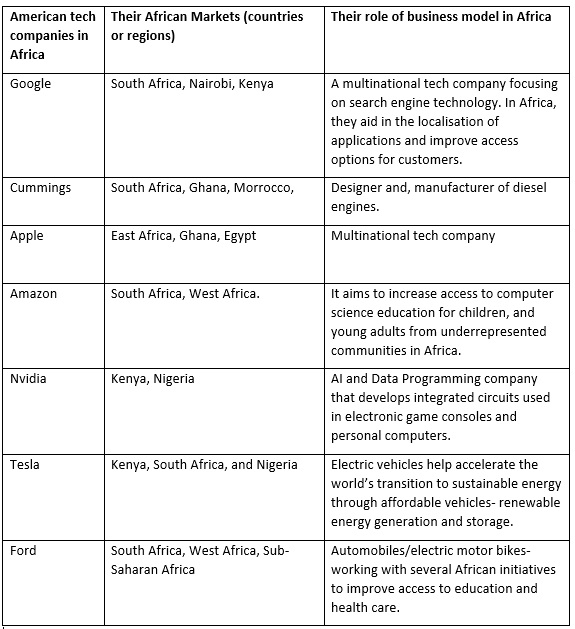Bridging the Technological Divide: Expanding Investment Horizons in Africa to Foster Technological Development

DOI reference: 10.1080/13673882.2024.00001007
By Tafara Chibebe, Lavonia Efe-Oviahon and Paul N. Ngang (LinkedIn; email), Thomas More University of Applied Sciences, Postgraduate in African Business Studies, Mechelen, Belgium.
The World Bank emphasizes the importance of ambitious digital development in Africa, but the continent faces challenges in keeping pace with global technological advancements. This study examines the efforts of both Africa and the United States to narrow this technological gap, focusing on the role of foreign investment as a catalyst for progress. The paper explores explicitly the significant potential of Africa’s youth population in driving economic and technological advancements, highlighting key investment opportunities.
Relationship between Africa and the USA: Historical Context
The historical relationship between Africa and the United States dates back to the 1500s when trade involved exchanging weapons, alcohol, and other goods for Africans, marking the beginning of a complex history. The legacy of slavery, which persisted until the 1900s, disrupted Africa’s economic and technological progress as many Africans were displaced from traditional trade routes. The consequences of this historical exploitation continue to impact the developmental gap between Africa and the United States.
Sanctions imposed by the United States on specific African countries further complicate the relationship. For example, Zimbabwe faced sanctions due to its land reform project, negatively affecting trade relations and deterring investors. Other African nations, such as Eritrea, Sudan, Somalia, Libya, and the Democratic Republic of Congo, have also been subjected to sanctions for various reasons, including human rights abuses and political instability. These sanctions can impede foreign direct investment (FDI), leading to economic challenges, increased borrowing fees, and high interest rates.
Exploring Technological Opportunities in Africa
Despite these historical and geopolitical challenges, Africa is an investment frontier with vast untapped potential. Currently, only 37% of Africa is connected to the internet, presenting significant opportunities for technological development. The continent’s youth population, exceeding 60%, is pivotal in driving economic growth and technological advancement. Investments in education are crucial to harnessing the potential of this youthful workforce, as evidenced by the record-breaking $2 billion in start-up funds acquired by African youth in 2021.
Moreover, Africa’s rich natural resources, including crude oil, lithium, and cobalt, attract foreign investment, particularly in the mining sector. American tech companies are increasingly recognizing the potential of the African market and establishing partnerships or aiding the continent’s development. Examples include [insert specific examples of American tech companies operating in Africa, fostering relationships, or contributing to Africa’s technological advancement]. These collaborations signify the growing recognition of Africa’s significance in the global technological landscape.

Future Collaborations and Opportunities
Education is a critical catalyst for global youth development, aiming to enhance lives and align with international development goals. It is pivotal in eradicating poverty and hunger and fostering economic growth and sustainable development. A vital aspect of this is digital education for youth, which enhances their educational experience, addresses unemployment issues, and promotes socio-economic development. Equipping youths with technological skills and ensuring connectivity is essential for realizing these benefits. The African Union’s (AU) digital transformation initiative is innovative and highly beneficial for youths, facilitating access to digital technology and vocational skills (Youth Education, 2013).
The African Continental Free Trade Area (AfCFTA), established in 2018, emerges as a strategic instrument to boost trade within Africa. It aims to enhance intra-regional trade in manufactured goods, reduce tariffs among member states, and address various policy areas related to trade facilitation and services. Overcoming historical barriers, such as outdated border and transport controls, is crucial for effective trade integration. The AfCFTA implements measures to streamline trade processes, including sanitary standards and technical barriers to trade in services. This initiative addresses the challenges of trade barriers and aims to make trading with neighbouring countries more cost-effective (The Promise of the African Continental Free Trade Area (AfCFTA), 2020).
Aligned with the AfCFTA, the AU’s Digital Transformation Strategy for 2030 strategically focuses on innovation, inclusive growth, and sustainability. This comprehensive strategy aims to create jobs, reduce poverty and inequality, facilitate the delivery of goods and services, and contribute to the achievement of Agenda 2063. Leveraging existing frameworks and initiatives, such as the Policy and Regulatory Initiative for Digital Africa (PRIDA), Programme for Infrastructure Development in Africa (PIDA), and the African Continental Free Trade Area (AfCFTA), the AU Digital Transformation Strategy envisions a Digital Single Market for Africa. Collaborative ICT regulatory measures and tools will be crucial to maximizing the opportunities presented by digital transformation across industries (The Digital Transformation Strategy for Africa 2020-2030). The strategy also emphasizes building inclusive digital skills, including technical and vocational skills, to empower the youth and position Africa advantageously in the global digital economy.
Conclusion
Several recommendations emerge to bridge the technological gap in Africa and harness the potential of foreign direct investment (FDI). Education is a key priority, particularly in STEM fields, as it lays the foundation for technology development. Encouraging entrepreneurship and innovation through initiatives like incubators and accelerators and funding support for start-ups can drive technological advancements. Infrastructure development supports technology growth, including roads, power, and internet access. Promoting foreign investment is equally vital, involving favourable conditions such as tax breaks and streamlined regulations. These recommendations, supported by insights from the World Bank, the African Union, and Edziah et al. (2022), can collectively contribute to narrowing the technological gap and fostering sustainable development in Africa.
Bibliography*
World Bank (2022) Digital Economy for Africa.
Oliveira, E., and P. Meyfroidt. 2022. Strategic spatial planning in emerging land-use frontiers: evidence from Mozambique. Ecology and Society 27(2):5.
Ernst & Young (2021) EY Africa Attractiveness Report 2021.
World Economic Forum (2021). The rise of African tech start-ups in 3 charts.
African Union (2020) The Digital Transformation Strategy for Africa (2020-2030).
Edziah, B. K., Sun, H., Adom, P. K., Wang, F., & Agyemang, A. O. (2022). The role of exogenous technological factors and renewable energy in carbon dioxide emission reduction in Sub-Saharan Africa. Renewable Energy, 196, 1418-1428.
Madzimambo, M. (2020, January 10). Ministry of Foreign Affairs & International Trade – IMPACT ON ZIMBABWE AND THE REGION OF THE UNILATERAL SANCTIONS IMPOSED BY THE UNITED STATES OF AMERICA AND THE EUROPEAN UNION.
Statista. (2022a, August 1). Internet penetration rate in Africa 2021, compared to the global rate.
* These references are part of the authors’ original work, ‘A Case Study On Business Relations Between Africa and China’. This article published in Regions e-zine Issue 17 is the authors’ reflective essay.
About the Authors
Tafara Chibebe and Lavonia Efe-Oviahon are former African Business Studies (PABS) postgraduate students. Paul N. Ngang is the PABS Director. The PABS is a pioneering program at Thomas More University of Applied Sciences in Belgium, the first in Europe. The program offers a curriculum in African Business that is taught in collaboration with African Embassies and top regional universities. With a focus on cross-cultural management, entrepreneurship, and business, PABS provides graduate students and future managers with the knowledge and skills to navigate the growing demand for world-class professionals in the global marketplace.